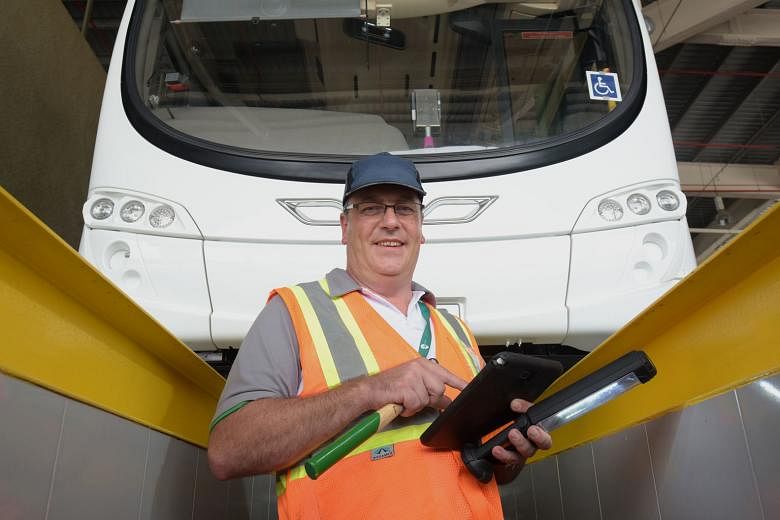If a double-decker bus driving past roars like an aircraft taking off, Mr Ray Silcox will instantly tell you that it has a defective engine cooling fan.
The 45-year-old Englishman, who has spent about 25 years servicing and maintaining buses, is so familiar with his trade that he can single out a problem just by listening carefully.
Mr Silcox, who moved here last October to join Tower Transit Singapore, will lead a 44-strong team of engineers and technicians under the island's third and newest bus operator.
His team will be responsible for keeping the company's 360-plus buses in shape and running smoothly on the 26 routes which the Anglo-Australian company will operate in western Singapore.
These services, which Tower Transit secured the rights to run under the Government's first bus contract, will start progressively from the second quarter of this year.
Under the new contracting regime, operators will be held to strict service standards, and to meet them, Tower Transit will be tapping Mr Silcox's expertise and skills.
Last July, the senior diagnostic engineer emerged as the top-scoring mechanical technician in the Institute of Road Transport Engineers Skills Challenge - a competition entered by teams from bus and coach operators from around Britain.
Mr Silcox, an electrician by trade, did not expect to win, as he was entered into the mechanical category which had him assessing tyre wear, gear boxes and brakes.
Asked how he did it, he said: "It was about what I learnt in college and what I picked up over the years, learning off skilled people, having a desire to learn more outside of my own field."
This philosophy of being a well-rounded engineer is one he hopes to bring to the team.
"For example, I want mechanics to learn about electrics. Up-skilling our engineers is one of the things I want to do. I don't want an engineer to start here and spend the next 15 years of his life changing oil," he said.
While individual staff will be specialists in their own fields of body repairs, electrical and mechanical engineering, they will be expected to learn from one another and work as a team.
"A mechanic can ask an electrician who is free to help with a difficult nut, that would take 10 minutes. In that time, he could run out and come back with the needed parts. That just lessens the time," Mr Silcox added.
On the technological side, Tower Transit will also be implementing a digital fleet management system called Freeway in Singapore, a first for the entire company.
It will allow, for example, bus captains to take photos and report defects on their vehicles using their mobile phones to alert the engineers to fix the problems.
By monitoring the bus usage, the Freeway system can also calculate and pre-emptively order what the fleet needs, such as oil.
Engineers can also enter inspection data onto tablets that can be converted to reports which are sent to the quality control team.
Another feature is that the firm's customer service department can also flag issues raised by passengers - such as if exhaust emissions smell foul.
"I never ever want a passenger to spot a defect, ever," he said, as this would mean the maintenance regime failed to spot the problem.
Mr Silcox said recruitment is a challenge for Singapore's bus industry, noting that the firm has filled only half of its 44 engineer positions.
Asked if his team will be ready for Tower Transit's launch in the second quarter, he said: "We can rely on contractors, but we want to employ as many people as possible and nurture them."
"It's still about nuts and bolts, but the problem is a lot of people think engineering is (working) on sooty old diesel engines, covered in oil and grease. Modern vehicles are not like that.
"Also, people don't realise that a bus costs more than a Ferrari. Buses (today) have advanced braking systems, traction control, telematics and the computing power of around five laptops," he said, to illustrate how the scope of the job has expanded.
For those who intend to join, Mr Silcox said he expects only the best of them. "If I fix this vehicle, I ask myself: "Will I be happy with my children riding on this bus?" If the answer is 'yes', that's good. But if it's not, get out of this trade."


